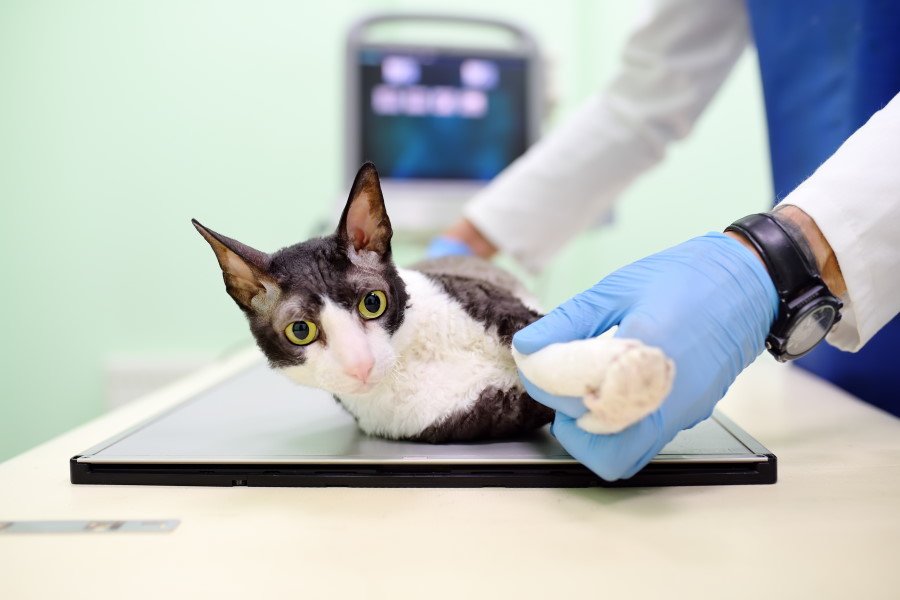Any parent, whether babies or fur babies knows the feeling of dread you get when your baby is sick or injured. It’s an awful feeling and something you want to address right away and the first thing you think is: “why is my cat limping?”
For injured cats, it can be a natural reaction to hide as a way to protect themselves from a predator.
You might not see blood or obvious issues themselves, but something is wrong. Now comes the hard part figuring out what the issue is and reacting appropriately. Of course, your first reaction is, you need to fix this, and fast! Well, never fear; we have compiled a short checklist of possible issues and how to react best to provide resolution to your feline companion.
Table of Contents
Figuring Out Why My Cat is Limping
First, know that cats are great at attempting to camouflage injuries. By the time they are showing evidence of a severe limp, you need to access quickly to ensure that medical intervention is not needed. A limping cat may show any of the following:
- Swelling or tenderness in the foot or leg
- Tiredness or marked changes in food or bathroom routines
- Unable to walk without pathetic noises emanating from them
- Refusing to allow you near the impacted limb
- Act aggressively at anyone coming near them
As any cat parent knows, cat’s in duress can scratch, claw and even hiss as a protective barrier to their stress. Therefore, ensuring that you approach the injured area with caution to avoid injury to yourself, your cat and further aggravating the issue is critical. Also, try to recall the events that led to the injury and see if you can determine if injury, possible insect sting or bite, or illness of any kind could be the culprit.
Should I Take My Cat to the Vet?
Determining if you need to rush Fluffy to the vet immediately is tricky in the cases of a limping cat. First, the severity of the injury is a factor. Are they able to eat, drink and walk at all? If they are lethargic, not eating, and the injury is pronounced, an immediate vet or vet hospital visit is called for. Additionally, what other symptoms they are having can be a good indicator of the severity of this concern.
For example, suppose breathing is labored to a point where they seem not to be getting enough air, you should see a vet.
Additionally, if your cat is vomiting, has diarrhea, or other imminent health concerns – that is a veterinarian visit in the making. If you know that the injury was caused by another animal biting or otherwise injuring them, get them to a vet to evaluate the seriousness of any puncture wounds and the like.
And obviously, injuries such as traffic accidents warrant a visit to the vet as soon as you can safely transport them.
Cats Can Be Fragile
Other concerns such as stings and bites by insects, as we will discuss in a moment, might warrant home remedies and a follow-up only with a veterinarian. Cat’s do not travel well, and taking them from their cubbies or comfort zone in the case of a limping injury can stir even more discord within their systems.
Because our cats do not travel well, we actually have a veterinarian that will visit our home. Since it’s expensive, we often do try home remedies first, and then call the Vet if it’s not working.
If you’re wondering what to do, you can help alleviate swelling and pain with hot compresses, monitoring food and bathroom occurrences, and keeping your fur baby comfortable might be all they need to be back on the road to recovery in no time.
My Cat Got Stung by a Bee?
One of the most common concerns with pets is allergic reactions to bites and stings. Cats kept inside will be less prone to these concerns, though allergies to many things could cause inflammation. If you believe a sting or bite is the cause of limping in your cat, some over-the-counter remedies such as Adizone C provide anti-inflammatory reduction specifically in cats.
What About Antihistamines for Cats?
Many of the most common human antihistamines on the market can be dosed for a cat. However, it is a good idea that even if you believe you will be able to administer treatment at home, a brief consult with a medical professional on the phone can provide assurances of proper dosages.
NOTE** THIS IS NOT MEDICAL ADVICE.
We have given our cats Zyrtec or Reactine (Cetirizine) with good success. You need to make sure you purchase the right one, since many antihistamines have other ingredients in them that aren’t safe. This helpful article will explain it more.
One other helpful benefit to having Cetirizine in the house – When guests come to visit and they’re suffering from allergies to our cats, one tablet usually takes care of their itchy, watery eyes and sneezing.
Don’t Panic if Your Cat is Limping
The first time you notice an obviously limping fur baby coming toward you, panic is sure to set in. Calmly approach them, keeping the tension and stress lowered to help minimize their panic responses. Evaluate what the problem is, at the level of discomfort and distress they are in.
Should this be something such as a bug bite, decide how severe and if antihistamines, hot compresses, and rest can fix it, or a veterinarian should be called. You got this and will be able to handle this emergency with your feline-like a champ, and you should have them on the road to recovery in no time.

Jonathon Hyjek is an entrepreneur and cat-lover. He is married to Joy and they share their home with their 2 feline-friends, Franklin & Ollie. Jonathon is a self-admitted “Crazy Cat Guy”. He started this website because of his love for his own cats and their well-being.

